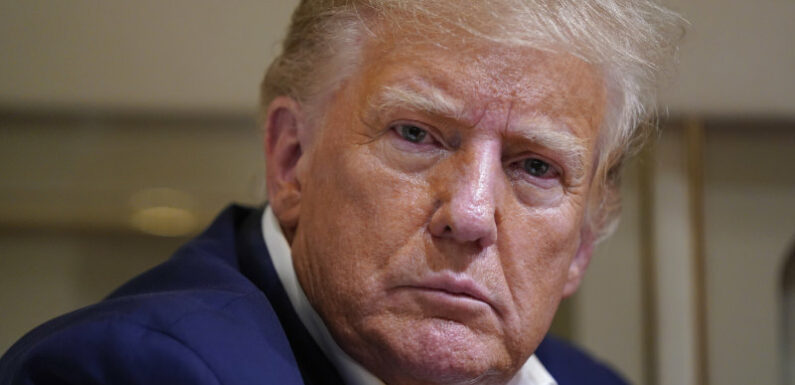
He will be fingerprinted. He will be photographed. He may even be handcuffed.
In the days ahead, Donald Trump is expected to walk through the routine steps of criminal arrest processing in New York, now that a grand jury has voted to indict him in connection with his role in a hush-money payment to a porn star. But the unprecedented arrest of a former commander in chief will be anything but routine.
Former President Donald Trump listens as he speaks with reporters while in flight on his plane after a campaign rally last weekend.Credit:AP
Accommodations may be made for Trump. While it is standard for defendants arrested on felony charges to be handcuffed, it is unclear whether an exception will be made for the former president because of his status. Most defendants have their hands cuffed behind their backs, but some white-collar defendants who are deemed to pose less of a danger have their hands secured in front of them.
Trump will almost certainly be accompanied at every step of the process — from the moment he is taken into custody until his appearance before a judge in lower Manhattan’s imposing Criminal Courts Building — by armed agents of the Secret Service, who are required by law to protect him at all times.
Security in the courthouse is provided by state court officers, with whom the Secret Service has worked in the past. But the chief spokesperson for the agency, Anthony J. Guglielmi, said he could not comment on any specific measures that would be put in place for Trump.
It may take several days for Trump to appear at the courthouse. Now that the grand jury, composed of members of the public who heard from witnesses and debated privately, has voted to indict him — meaning to charge him with one or more crimes — the indictment must be handed up to prosecutors.
Lawyers for Trump, who is running for president a third time, have said he will surrender to face the charges and fly from his Florida estate to New York for the arraignment.
After he is arraigned, he is almost certain to be released on his own recognizance because the indictment will likely contain only nonviolent felony charges; under New York law, prosecutors cannot request bail in such cases.
The former president plans to use the charges as part of a campaign strategy to rile up his base.
Surrender, some might argue, is not in the confrontational former president’s DNA, and he often seems to relish antagonising and attacking the prosecutors who have investigated him. He has called Alvin Bragg, the Manhattan district attorney who secured the hush money indictment and who is Black, “a racist,” and said that his investigation was politically motivated.
Manhattan District Attorney Alvin Bragg leaves the District Attorney’s office in New York.Credit:AP
In the unlikely event that the former president refuses to surrender, he would put Governor Ron DeSantis of Florida, his leading but undeclared rival for the Republican nomination, in an awkward political position. Under law, DeSantis’ role would be essentially ministerial and he would have few legal options other than approving an extradition request from New York.
Still, if New York prosecutors sought Trump’s extradition, DeSantis would face an unenviable dilemma. He would be compelled to choose between authorising an arrest warrant for Trump and inflaming his base, or attempting in some way to aid his Republican rival, and possibly face legal action as a result.
This article originally appeared in The New York Times.
Most Viewed in World
From our partners
Source: Read Full Article

